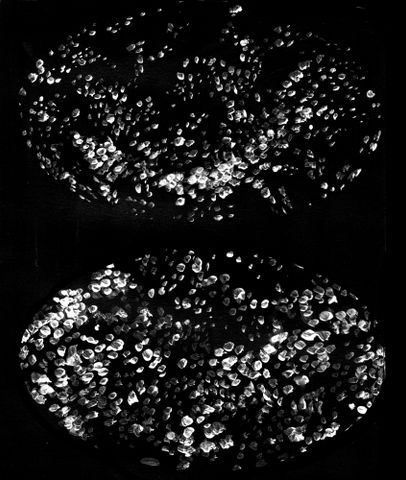Practice
Wonder
with Molly Nesbit, Tomás Saraceno and guests

Molly Nesbit (Department of Art, Vassar College, Poughkeepsie, NY), Tomás Saraceno (artist, Berlin), and guests
Performances by:
Cyrtophora citricola quintet on Steatoda Virgo cluster
& Tegenaria atrica on ‘Hybrid web-instrument NGC 5195: Messier 51b
What is the initial experience of knowledge? In going back to our encounters with the wondrous, the joy of being in the world resounds as a “gay science,” where all that is creative counts as knowledge. No longer delegated to the pejorative category of pathos and tragedy, our common sense for wonder re-emerges from its modern hibernation and embraces the unknowability of the world: although we may know “facts,” we still tell stories. Though science clarifies and enlightens, its deeper inquiries cross the threshold of the aesthetic, filling both expert nd layman with awe or stupefication. Wonder serves as a fundamental quality to our sensible education—the “school of life,” where a walk in the woods, a body’s transformation, a life-changing lecture, or a blinding love all serve to teach, to change. Wonder influences our decisions, informs our modes of expression, and impacts our knowledge. Thus, it carries the potential of utopia, the unreachable elsewhere towards which all projects of transformation strive. And so, we depart from this horizon of possibility.
The evening will open out into a string of encounters: a concert of ideas, a troupe of social spiders, music, drama, webs, dreams, messages and unannounced guests arrive. Together we will weave. We will wonder about the fate of the Anthropocene. Hard questions will be planted onstage. Nietzsche’s question marks hover in the wings. He would want us to set our perspectives coldly and gaily. Like him, we seek the conditions of freedom as we travel on. The old question of utopia comes back in new form. It’s a tough one: What is a sustainable aesthetics?
Thanks to: Adrian Krell, Jol Thomson, Odysseas Klissouras, Dorota Gaweda, Jo Grys and Prof. Dr. Hannelore Hoch and Dr. Roland Mühlethaler of the Museum für Naturkunde, Hemiptera Research Group, Leibniz-Institut für Evolutions- und Biodiversitätsforschung an der Humboldt-Universität zu Berlin and Polytec for the support of the Practice Wonder, as well as Les Documents Cinématographiques, Paris, especially Marie Jäger, whose generosity has made possible the screening of Jean Painlevé, “Hippocampe / the Sea Horse”, (1934)